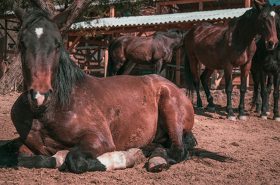This blood test determines if your horse is an Equine Infectious Anemia carrier.
A Coggins test is required when transporting a horse interstate. While most horse owners have heard of this special piece of paper, many don’t really know what it is and why it’s so important. Basically, it’s a blood test that looks for the presence of Equine Infectious Anemia (EIA) antibodies. This serious viral disease is not one you want to mess with! There are multiple ways of testing for it, but the Coggins test is most recognized.
Let’s Talk About Equine Infectious Anemia
This viral disease is bloodborne. It’s transmitted through biting flies. A deer or horse fly will bite a horse carrying EIA, then pass the infected blood to a non-infected one. Since biting flies are hard to eliminate, those in the same area of an infected horse are at risk. It can also be passed through contaminated needles or syringes.
Unfortunately, there is no treatment for the disease or even vaccine to prevent it. Some symptoms include fever, weight loss, and disorientation. EIA is also fatal in many cases. Some horses with the disease are known as asymptomatic carriers with no visual signs. Any horse that tests positive will need permanent quarantine and has to be kept 200 yards from other horses. Many of them are euthanized, since this is a life-long disease.
The Coggins Test
Performed by a licensed veterinarian, the Coggins test must be sent to an accredited lab for analysis. They will examine the blood and look for the EIA antibodies. The results will either be positive or negative. A paper or electronic certificate will be issued. It includes the owner’s information, stable information, veterinarian, horse’s identification, and EIA test details. The results are valid for one year.
This test is essential for reducing the spread of Equine Infectious Anemia. Since there’s no treatment or preventive vaccine, it’s important to identify carriers and have them moved away from other horses. Horse owners are advised to continuously check their horses for symptoms, as well.
All states require a negative Coggins test for traveling in and out. Some even require it for trailering within the state. Many states consider the test valid for one year, but there are some where it’s only good for six months. You’ll want to check the requirements of the state you plan to enter. Additionally, many competitions and boarding barns will want to see a negative Coggins test before the horse is permitted to enter the premises.
When buying a new horse, they should come with a negative Coggins. Make sure you ask to see it before you purchase the horse!
Reducing EIA
As previously mentioned, there’s no vaccine against this disease. It’s advisable to reduce fly populations though. Some strategies include manure management, Fly Predators, fly traps, bug spray, and fly masks/sheets.
Additionally, use sterile needles when doing vaccines. For multi-dose vaccine bottles, use a new needle for each individual horse. When traveling to competitions, only attend those that require negative tests. That also includes boarding at a barn that makes the Coggins test a yearly requirement.
It’s a good idea to have your vet do a Coggins test yearly! By doing an annual test, you’re helping to reduce the risk of EIA transmisson in your area.



